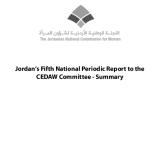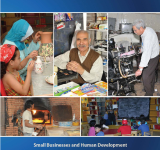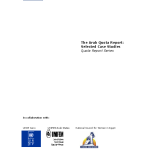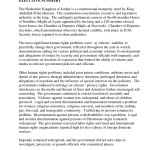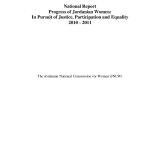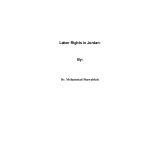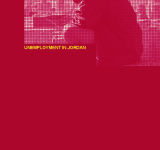labour
This report explores the role of Small and Medium-Enterprises (SME);; as an agent for sustainable human development in Jordan. It analyzes SMEs and their contribution to human development using fours key central pillars of human development;; namely: economic growth that is equitable and pro-poor;; social progress;; participation and empowerment through micro finance;; and environmental sustainability. The report analyses the link between SMEs and empowerment or lack thereof;; with a specific focus on the two issues of employment;; as a tool for empowerment;; and the capacity of SMEs to enhance the position of women within the workforce and home. The report findings were based on extensive research;; a survey of 1;;500 firms and focus groups discussions conducted across the governorates of Jordan. The report proposed general recommendations in terms of institutional coordination;; exports;; cluster groups;; quality standard;; government monitoring;; tax law;; local development;; youth empowerment and the increase of minimum wage.
This report was compiled from the findings and case studies presented at a workshop held on 5-6 December 2004;; in Cairo Egypt. This report contains an overview on global trends and regional analyses;; implementing legislated quotas for women;; quota adopted by political parties;; methods on enhance women’s participation;; and the role of the international community and international instruments. The international IDEA had convened a series of regional workshops to gather qualitative data. The report also has 6 case studies about women’s participation and quota include comparative experiences with quotas;; address the culture challenges to women’s representation in the Arab world;; and point the opportunities that could be seized in order to meet those challenges.
يهدف التقرير إلى عرض أهم مشاكل حقوق الإنسان في الأردن;; والتي كان ابرزها: سوء المعاملة ومزاعم التعذيب من قبل مسؤولي الأمن والحكومة مع الإفلات من العقاب;; والقيود المفروضة على حرية التعبير التي تحد من قدرة المواطنين ووسائل الإعلام في انتقاد السياسات والمسؤولين الحكوميين;; وشملت أيضاً ظروف السجن السيئة والاعتقال التعسفي والحرمان من المحاكمة العادلة من خلال الاعتقال الإداري;; والاحتجاز لفترات طويلة;; ومزاعم من المحسوبية ونفوذ المصالح الخاصة على القضاء. واستمرت الحكومة في التعدي على حقوق الخصوصية للمواطنين. وكان العنف ضد المرأة منتشراً على نطاق واسع;; واستمرار الاعتداء على الأطفال. والى جانب انه لا يزال التمييز القانوني والمجتمعي والمضايقات تمثل مشكلة بالنسبة للمرأة. وكان التمييز ضد الأشخاص ذوي الإعاقة مشكلة. وظل التمييز القانوني والمجتمعي ضد الأشخاص من أصل فلسطيني واسع النطاق. وذكر التقرير أن الحكومة قيدت حقوق العمال ومنظمات حقوق الإنسان المحلية والدولية على مستويات عالية من إساءة معاملة خدم المنازل الأجانب. ولقد كانت المواضيع الرئيسية في هذا التقرير هي: الحق في العمل;; الحق في الخصوصية والحق في التعليم;; والتمييز العنصري;; والتمييز ضد المرأة;; والحق في حرية التنقل;; والحق في حرية التعبير;; والحق في حرية تكوين الجمعيات;; والحق في حرية الدين ;; والعنف;; وعمالة الأطفال;; الحق في محاكمة عادلة;; الحق في المشاركة;; الحق في الضمان الاجتماعي.
This report is designed to trace the status of girls and women in Jordan. The main themes are: civic rights;; legal rights;; women political participation;; education;; participation in the labour market;; health;; reproductive health;; child protection;; domestic violence;; HIV/AIDS and treaties.
This national report is designed to trace the progress of women in various fields;; monitoring achievements;; and highlighting gaps and failures;; as well as analyzing indicators;; recommending measures;; and measuring levels of achievements in the implementation of plans and strategies. The main themes were selected according to national priorities dictated by each stage: Legal Protection for Women's Right to Access Justice;; Participation;; the Economic Empowerment of Jordanian Women;; Equality;; Citizenship and Decision-Making in Public Life. The conclusions of this report confirm that a much smaller effort was exerted at the level of providing information;; data and the provision of services in the area of providing justice and facilitating ways of achieving it. The lack of knowledge about available services among women;; whether provided by civil society organizations or government institutions;; affects women's ability to access justice negatively. Regarding the economic participation the Policies and plans that targeted empowering women economically show that the result of these policies was weak and limited. Difficulty of women’s access to job opportunities in the private sector and inequitable pay between the sexes;; lack of supporting services to working women;; including childcare Facilities;; poor matching between education outputs and skills required in the labor market and the traditional social standards that contribute to directing females towards certain professions. The report proposed general recommendations and directions that include quick solutions to deal with the main highlighted challenges.
This paper aims at shedding light on the labor rights in Jordan;; particularly for those who are working in the informal sector;; through identifying the factors that impede them from enjoying such rights and;; thus;; coming up with the appropriate recommendations in this area.
This pilot study report was initiated by the European Training Foundation (ETF);; in close cooperation with the National Center for Human Resources Development (NCHRD) in Jordan;; in the framework of the ETF multiannual project Observatory Function Development in Jordan. The focus of this report is unemployment. However;; considering that unemployment information in itself should not be used or analysed in isolation from other indicators or data;; the report begins by providing an overview of the general labour market situation in Jordan. After the main data on employment by sector;; age;; gender and level of education are presented;; on the basis of the available information;; the specific cases of non-Jordanian employees and employment in the informal economy are highlighted as topics requiring special attention in the Jordanian labour market. In conclusion;; two groups of recommendations are proposed: (i) technical recommendations to main information providers for improving the quality of the information collected;; and (ii) a set of policy recommendations for tackling unemployment. These recommendations are intended to support policymakers in their commitment and willingness to adapt both the formal and informal education and training system and the whole labour market in Jordan.
